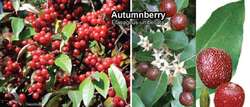Among the most pressing of threats is the encroachment of invasive species of plants, including
autumn olive and shatter cane, and how to eradicate these species at the park.
Chickweed
Autumn Olive Salad Recipe It's hard to beat a fresh salad made from wild edibles that have been foraged from your own property.
But, as so often happens, the wildlands around the river were left unmanaged, leading to an unhealthy overgrowth of regionally invasive pear trees and
autumn olive. With the Patoka River National Wildlife Refuge being an intersection between critically depleted oak savannas and bottomland, restoring this land properly is a priority.
One such plant in our area is the
autumn olive. Birds and turkeys love
autumn olive berries, and the deer bed in the thickets as well, but there are other more desirable shrubs that game animals will eat that aren't considered invasive.
When invasive plants like
autumn olive, buckthorn, barberry, bush honeysuckle, or Phragmites invade a plant community, they replace the local native species at that site, potentially causing complete local extinction or a decline in plants that contribute to ecosystem function.
Autumn olive (Elaeagnus umbellata) and Russian olive (Elaeagnus angustifolia) were introduced in the 1830s from Asia for wildlife cover and food.
Along with popular variations like Concord grape and peanut butter, which uses grapes from neighbors' gardens, owner Renee Erickson and pastry chef Clare Gordon are piping their sugared confections with housemade fillings such as spiced apple (featuring brandy, cinnamon, and clove) and quince and
autumn olive jam (with fruit from Sleeping Sea farm on Orcas Island).
Alterations in Soil Fertility by
Autumn Olive May Temporarily Affect Native Shrubs.
Although these results suggest that this site continues to provide suitable nesting habitat for obligate grassland species, the increasing encroachment of
autumn olive (Elaeagnus umbellate) may be attracting more shrub-nesting bird species as well as mammalian predators which should be a focus in future research.
People from Devon will also be encouraged to visit Deir Istya and the surrounding areas during the annual
autumn olive harvest.
